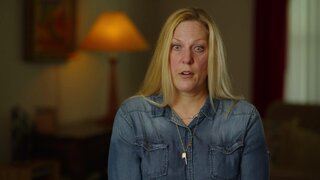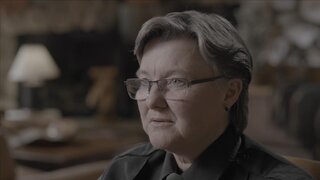Create a free profile to get unlimited access to exclusive videos, breaking news, sweepstakes, and more!
A Successful Lawyer Is Found Dead In A South Florida Canal — Who Wanted Her Dead?
The search for the person who strangled Melissa Lewis to death and dumped her in a canal led to many twists and turns.
Investigators had to work with a long list of suspects after a successful lawyer’s body was found in a southern Florida canal.
The city of Plantation winds with a series of manufactured canals in Florida’s Everglade wetlands. The waterways run through the backyards of Floridian homes, not far from where Melissa Lewis lived.The 39-year-old lawyer relocated to the Sunshine State when a job opportunity presented itself at the prestigious Rothstein Rosenfeldt Adler law firm, where her best friend, Debra Coffey, worked.
“Melissa was a very high-energy, motivated person,” Coffey told “Buried in The Backyard,” airing Thursdays at 8/7c on Oxygen. “If she set her mind towards something, she accomplished the goal.”
According to Lewis' sister, Carrie Homberg, she was on an ambitious path with the aim of one day becoming a judge.
“Missy was an advocate for victims of domestic violence,” said Homberg. “She would donate things for women in distress.”
Lewis even helped her friend Coffey through her own embittered divorce. But on the morning of March 6, 1998, friends and colleagues grew concerned when Lewis failed to show up for a morning meeting at the firm, where she was made partner.
A worried Coffey called Homberg and local police, asking authorities to do a welfare check on Lewis. The women met with the officer at Lewis' residence and made a disturbing find: In the garage, Lewis' car was gone. Left behind were bagged groceries and pepper spray all over the garage door and around the pet door. Coffey also found a button from Lewis' suit on the floor.
“We started coming up with different theories on what could have happened,” said Brian Kendall of the Plantation Police Department. “Could somebody have followed her in to commit a home burglary? Or even possibly a carjacking?”
Investigators used the OnStar security on Lewis' car to access the vehicle’s GPS. They found the car within walking distance of Lewis' home, but there was no sign of the missing woman. In the trunk were her shoes and suit jacket, missing the button found on the garage floor.
Homberg said she spoke with Lewis the previous evening. Lewis talked from the Publix grocery store, where she usually stopped on the way home from the office. Surveillance video put her in the store but failed to show a suspect who could have followed her. Based on Lewis' suit and the groceries found in her garage, investigators determined the struggle happened after she returned home.
“Usually in those robbery [or] carjacking scenarios, the body’s not missing,” said Kendall. “In my experience, people aren’t put in the back of a stolen vehicle and driven away somewhere. So her disappearance was really unusual.”
On the morning of March 8, 1998, four miles from Lewis' home, a maintenance worker at a canal went to inspect what he believed was a clog in the grating system.
What he found was the body of Melissa Lewis.
A later autopsy listed her cause of death as manual strangulation, leading detectives to theorize that the murder was personal. They brought Coffey and Homberg, the women closest to Melissa, in for more questioning.
“I remembered Missy was an advocate for domestic violence because of Debra [Coffey],” said Homberg. “And I remember my sister telling me that Debra’s husband, Tony, had threatened to set Debra on fire in front of her children. That he had slashed her tires.”
Coffey was open with officers, explaining she was going through a rough divorce with Tony Villegas. But she couldn’t see why Villegas would have reason to kill Melissa, putting him near the bottom of investigators’ suspect list.
They then looked to Homberg’s ex-husband and Lewis' former brother-in-law, Anthony Godinez, who had a criminal history of drug use and armed robbery.
“I told the police, ‘Melissa did help me fill out the divorce papers,’” said Homberg. “And then [Lewis] told me that he went to her house. And it startled her a little bit.”
Detectives looked into him but discovered Godinez had since been diagnosed with multiple sclerosis and was not physically capable of carrying out the abduction and murder.
“We spoke with him, and he had a reasonable alibi on the night she went missing,” said Kendall.
After several dead ends, police turned to Lewis' career, interviewing the law firm’s founding partner, Scott Rothstein. Friends and family said Lewis and the affluent Rothstein had a close relationship. His firm even offered a $250,000 reward for information in Lewis' case and paid for her funeral. But after sifting through her caseloads, investigators could find no red flags.
Around this time, police received Lewis' cell phone records, which tracked her movements on the night she vanished. As purported, records showed Lewis leaving work and stopping at the Publix grocery store. She arrived home at around 8:00 p.m., where the signal remained for nearly an hour before moving once again.
Police say the cell phone moved to where someone dumped her body in the canal before crossing over county lines and stopping at the city of Hialeah, some 30 miles away.
The next morning, the cell phone traveled again, this time on a direct and straight path up to Palm Beach County. Then the signal was lost.
Because the phone stopped for the night in Hialeah, authorities believed the killer did, too. Failing to get an exact location for the phone, they turned back to Homberg and Coffey to glean information about anyone Lewis could have known in Hialeah.
“It was just horrible,” said a crying Debra Coffey. “Because it was then that I realized that she’s gone because of me.”
Coffey told detectives that her soon-to-be ex-husband, Tony Villegas, was staying with a friend in Hialeah, not far from the tower where Lewis' phone pinged. She also revealed that Villegas worked as a train conductor on the same direct path where Lewis' phone moved into Palm Beach County the morning after the murder.
“The track of the cell phone is mirroring where Tony Villegas would be. Where he lives and where he works,” said Broward County lead prosecutor Shari Tate-Jenkins. “Police now subpoena Villegas’ phone records. On the night that Melissa Lewis was killed, wherever Melissa Lewis’s phone was, so was Tony Villegas’ phone.”
The shocking discovery was enough for detectives to get a search warrant for the Hialeah apartment Villegas shared with his roommate.
“His roommate said that on the night Melissa Lewis went missing, Tony Villegas came home late that night and had asked if he knew of a way to wash off or get rid of pepper spray on your body,” said Tate-Jenkins. “That set off alarm bells.”
The DNA found on Lewis' suit jacket was further matched to Tony Villegas.
One week after her murder, Lewis was laid to rest on the same day authorities arrested Villegas and charged him with first-degree murder. Villegas claimed he was innocent and that someone framed him.
But as Villegas’s defense stalled the judicial process for more than a year, shocking news reached Floridians: Lewis' law partner, Scott Rothstein, was named the subject of a massive criminal Ponzi scheme investigation. It was one of the biggest Ponzi schemes in United States history.
As Rothstein fled the county for Morocco, an FBI probe revealed that one of Rothstein’s partners in the fraud was Debra Coffey.
Could the multi-billion dollar crime be the motive for Melissa Lewis’ murder?
“As prosecutors in the case, the Ponzi scheme cannot be ignored,” said prosecutor Tate-Jenkins.
Investigators looked into the theory that Lewis could have learned about the Ponzi scheme and threatened to alert authorities or was herself directly involved in it. It might be motive for Rothstein or Coffey to eliminate her, if so.
“The theory didn’t hold up,” said Kendall. “There was no connection from Scott Rothstein’s activity to the death of Melissa Lewis.”
Melissa Lewis was not named as ever being part of the Ponzi scheme.
A tearful Coffey said that she lives in regret.
“Melissa would have been horrified,” said Coffey. “It was humiliating. It was just the worst. And it’s a guilt I guess I live with forever.”
Eight years after he strangled Lewis to death on the floor of her garage and dumped her in the canal, Villegas was found guilty of first-degree murder. Prosecutors postulated he blamed Lewis for Coffey's decision to leave him.
Villegas was sentenced to life in prison.
“She was just a very special person taken away from us because of an evil person who didn’t get his way,” said Coffey. “It’s senseless.”
Tony Villegas is serving a life sentence at the Columbia Correctional Institution in Lake City, Florida.
Scott Rothstein is serving 50 years for racketeering, money laundering, and mail and wire fraud. Debra Coffey was sentenced to 10 years for her role in the Ponzi scheme and was released on parole after three and a half years.
For more on this case and others like it, watch "Buried In The Backyard," airing Thursdays at 8/7c on Oxygen or stream episodes here.























